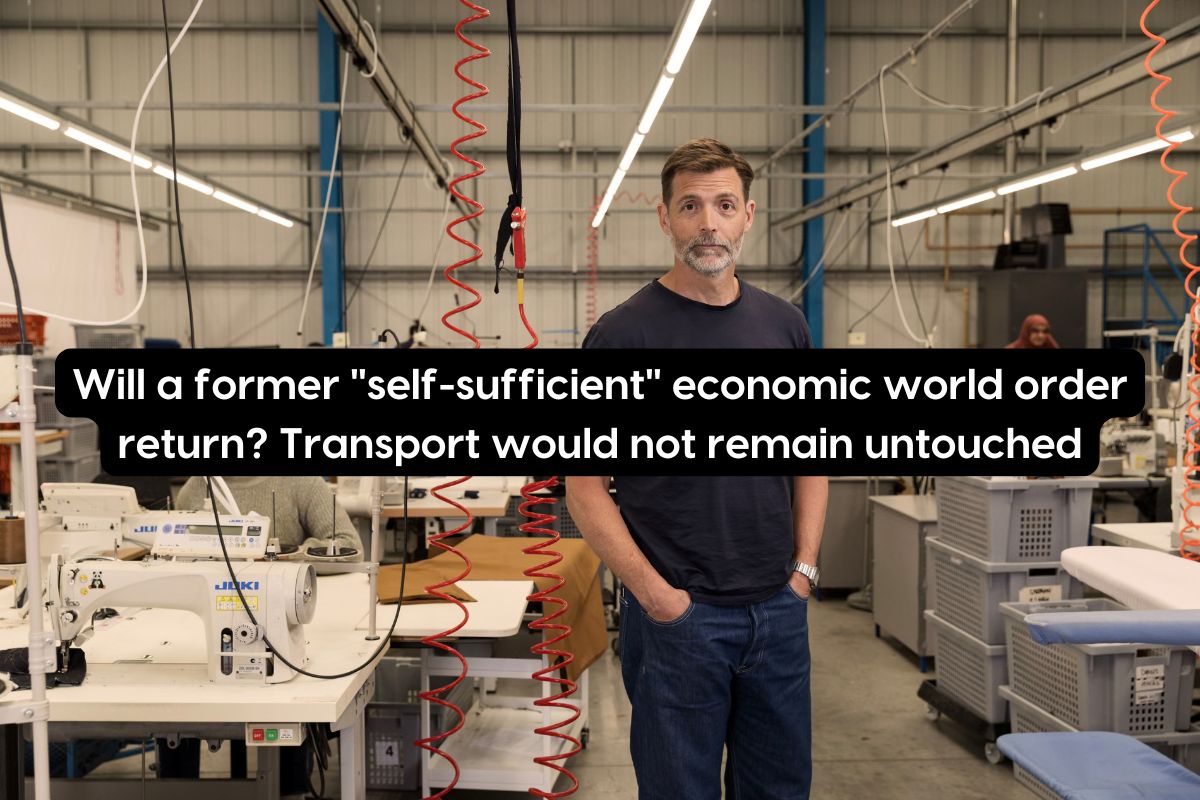At school we were taught that the first phase of the Middle Ages was a period of subsistence farming. Later, the mercantilist economic philosophy brought something similar and the tariff war that broke out this year is also encouraging the spread of import substitution. This could also create a new situation in the transport industry. The thinking of a British entrepreneur offers a glimpse into the ‘new world order’.
One determined anti-consumerist is the owner of a clothing company who is seeking a balance between business and sustainable living. That’s how the Guardian introduced Patrick James Grant, Scottish clothier, businessman, television personality and writer, who is a director of Community Clothing, a for-profit second-hand clothing retailer and director of textile manufacturer Cookson & Clegg.
The occasion came as Grant was touring the UK to launch his new collection. Underneath his trousers he was wearing white elastic underpants, which are not made by an Asian light industry company but by a Welsh firm. Her shoes were made in Bolton, near Manchester, England, and her socks in Sussex. Her outfit is a living example of how she envisages the future of the clothing industry.
But for a businessman, it’s not just the way people dress that matters, it’s everything around them. A Guradian journalist visited him at Cookson & Clegg’s offices in Blackburn, northern England. He bought the company in 2015. Since then, the office has been refurbished. The desk they were sitting at came from the non-profit Freecycle, a global network of “gifting” groups that recycle old furnishings, among other things.
Its bookshelf was salvaged from a scrapyard and refurbished. They are clearly important to the 53-year-old business owner, who is also a judge on the television show The Great British Sewing Bee and author of the book “Less”, which is published with noble simplicity.
Sometimes it’s the subtitle of the book that tells you what to expect
What is meant by “less” is revealed in the subtitle of the book, “Stop Buying So Much Rubbish: How Having Fewer, Better Things Can Make Us Happier”. In other words, the author recommends that we stop buying all the crappy products we waste our money on. He promises to tell us how we can be happier by using fewer, more durable things.
“Less” is therefore an anti-shopping guide. It encourages readers to think twice before throwing anything in the bin. This may come as a surprise when you consider that the author, Grant, has been designing, manufacturing and retailing clothes for twenty years. He bought his first business, a tailor’s shop, in 2006 on the basis of an advertisement in the Financial Times.
Ten years later, in 2016, he founded Community Clothing, a for-profit community business. This retailer now relies in part on the manufacturing capacity of Cookson & Clegg. The latter was founded in 1860 and worked for the British Army until 2009. However, it has not found its place in the civilian clothing market, even under Grant’s leadership.
The business model of sustainability relies on the short delivery of the final product
After losing its main customer, a chain of department stores, it went bankrupt in 2016. The entrepreneur resurrected it by setting up Community Clothing, by bringing in a number of other small UK companies to manufacture it. The business model is to manufacture products in factories that have been revived in the rust belt of British industry, with minimal supply chain, delivery and profit margins.
The main form of sales is the company’s own webshop. They also set up pop-up shops. These are premises rented for a few weeks or months in shopping centres. Because of their temporary nature, they do not require expensive equipment or decoration. Another principle is that they do not take part in promotions or trade events such as Black Friday.
They aim for the evergreen in their fashion to avoid fast fashion, which changes every few months and results in mountains of clothes in landfills. One aspect of the production is to make the product durable. Community Clothing regularly uses up stocks of fabrics that would otherwise end up in landfills.
The clothes are picked up by local people at each local market and presented with their own make-up. They therefore skip fashion shows and make sure that marketing costs do not exceed five percent of sales.
Patrick Grant hates fashion and is a living example of how to avoid following fashion
The alternative businessman believes that fashion is a way to get people to buy things they don’t need. The ultimate version of this is fast fashion, where new fashions can be created every month, forcing people to change their clothes. Clothes are made to last a few weeks or months and then they go in the bin.
Grant argues in favour of his business philosophy of durability, which opposes the frequent replacement of clothes, that the pursuit of economic growth, which encourages the latter, has not made life better for ordinary people. Meanwhile, most businesses pocket the profits accumulated from people’s purchases, and because they give poor products in return to customers, they pocket their money for next to nothing.
This has given rise to the “Buy less!” mentality. However, the businessman admits that he is perhaps offering an oversimplified philosophy of life. Perhaps the monkish simplicity that characterises him cannot be extended. He usually wears collarless T-shirts and jeans, and his underwear is military-style.
LogMASter’s competitive service from the Far East
Our rail freight services from China with short transit times!
Need just a few pallets of goods from your Chinese supplier urgently?
We will import your shipment from China and deliver it to your door with customs clearance in 18 days!
Contact our colleagues at sales@logmaster.eu!
